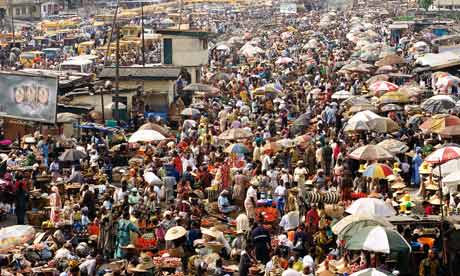
In 1994, Robert Kaplan, a journalist and author who had written a prescient book about the Balkans, Balkan Ghosts, wrote an influential article in the Atlantic Monthly called The Coming Anarchy in which he painted a grim portrait of the future of Africa and much of the world.
In the article, Kaplan refers to the environment as a “hostile power” and calls it the “national security issue of the twenty-first century”. The vision is of hundreds of millions of people living in slums and shanty town who are “stuck in history where attempts to rise above poverty, cultural dysfunction and ethnic strife will be doomed by a lack of water to drink, soil to till and space to survive in”.

Kaplan argued that countries like Nigeria, India, and Brazil will never get it together and that the best the West will be able to do is to protect itself against the spread of the chaos. The article was reportedly very influential in the administration of former U.S. President Bill Clinton.
20 Years of progress?
I read Kaplan’s article the other day and was struck by how much has changed in 20 years in certain parts of the continent while in others, it seems his view of the future was tragically correct.

If Kaplan had been correct in 1994, then we would not see the incredible economic growth that is occurring in Africa and that attracted the attention of my full time MBA students that I covered in last week’s post. Spurred on by demand in commodities, African governments are embarking on large scale infrastructure projects, social development and, as in another post, making real progress on the UN’s millennium development goals!
On the other hand, the situation in Somalia has not improved too much since Kaplan’s article came out and only with the backing of Kenya’s military does it look like the Somali government has a chance to defeat Al Shabaab.
The Environment at the heart of the problem

In 1798, the Reverend Thomas Malthus wrote that with population rising exponentially and food production only rising arithmetically, there would come a time that the earth would not be able to sustain its population. Kaplan’s article joins the neo-Mathusian tradition of predicting our world’s collapse as population expands beyonds the environment’s ability to deal with it.
One horrific example appears to have been the killing of somewhere between 500,000 and 800,000 Tutsi’s in Rwanda in 1994 which a number of scholars, including Canada’s Stephen Brosha have attributed to the underlying environmental problems in the country prior to 1994.

The problem with this view is that Rwanda has enjoyed a stable government since Paul Kagame, a controversial figure, became president fourteen years ago this month. Since then Rwanda has adopted a new flag, constitution, and and has gone through a national process to move past the genocide of 1994.
According the World Bank, Rwanda “achieved impressive development progress” since 1994. Currently, the economy is growing at 7% per year and at Davos Kagame said that Rwanda is on target to meet all of its millennium development goals.
Give me Hope!
It seems in every generation Neo-Malthusians predict our imminent collapse and while no can deny the daunting environmental problems facing Africa, history has shown that economic and technological development has constantly led us to re-evaluate the earth’s capacity to support larger numbers of people. I for one will bet on the entrepreneurial spirit of the people of Africa and their political maturity to build a better world and avoid Kaplan’s “coming anarchy”.


Great post Mike, thank you. The challenges are great but if the past twenty years are in any way am indication of the future, the Africa of tomorrow can only be better than the one responsible for the worldview which rightly or wrongly (depending on one’s view) we had become accustomed to having as the Africa of the next forever and a day.
Africans will also need to tell their own story. As the African proverb goes (pardon any misquotes I write without reference), “until the lion learns to tell his own story, the hunter will always be the hero of his tale”.